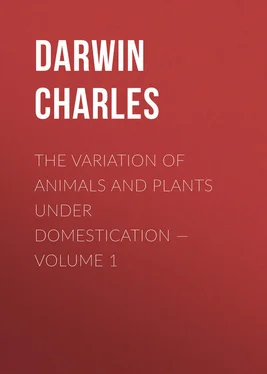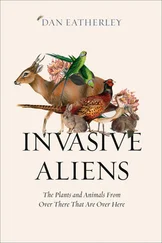Charles Darwin - The Variation of Animals and Plants under Domestication — Volume 1
Здесь есть возможность читать онлайн «Charles Darwin - The Variation of Animals and Plants under Domestication — Volume 1» — ознакомительный отрывок электронной книги совершенно бесплатно, а после прочтения отрывка купить полную версию. В некоторых случаях можно слушать аудио, скачать через торрент в формате fb2 и присутствует краткое содержание. Жанр: foreign_antique, foreign_prose, на английском языке. Описание произведения, (предисловие) а так же отзывы посетителей доступны на портале библиотеки ЛибКат.
- Название:The Variation of Animals and Plants under Domestication — Volume 1
- Автор:
- Жанр:
- Год:неизвестен
- ISBN:нет данных
- Рейтинг книги:5 / 5. Голосов: 1
-
Избранное:Добавить в избранное
- Отзывы:
-
Ваша оценка:
- 100
- 1
- 2
- 3
- 4
- 5
The Variation of Animals and Plants under Domestication — Volume 1: краткое содержание, описание и аннотация
Предлагаем к чтению аннотацию, описание, краткое содержание или предисловие (зависит от того, что написал сам автор книги «The Variation of Animals and Plants under Domestication — Volume 1»). Если вы не нашли необходимую информацию о книге — напишите в комментариях, мы постараемся отыскать её.
The Variation of Animals and Plants under Domestication — Volume 1 — читать онлайн ознакомительный отрывок
Ниже представлен текст книги, разбитый по страницам. Система сохранения места последней прочитанной страницы, позволяет с удобством читать онлайн бесплатно книгу «The Variation of Animals and Plants under Domestication — Volume 1», без необходимости каждый раз заново искать на чём Вы остановились. Поставьте закладку, и сможете в любой момент перейти на страницу, на которой закончили чтение.
Интервал:
Закладка:
But it may be urged, granting that organic beings in a state of nature present some varieties, — that their organisation is in some slight degree plastic; granting that many animals and plants have varied greatly under domestication, and that man by his power of selection has gone on accumulating such variations until he has made strongly marked and firmly inherited races; granting all this, how, it may be asked, have species arisen in a state of nature? The differences between natural varieties are slight; whereas the differences are considerable between the species of the same genus, and great between the species of distinct genera. How do these lesser differences become augmented into the greater difference? How do varieties, or as I have called them incipient species, become converted into true and well-defined species? How has each new species been adapted to the surrounding physical conditions, and to the other forms of life on which it in any way depends? We see on every side of us innumerable adaptations and contrivances, which have justly excited the highest admiration of every observer. There is, for instance, a fly (Cecidomyia (Introduction/3. Leon Dufour in 'Annales des Science. Nat.' (3rd series, Zoolog.) tome 5 page 6.)) which deposits its eggs within the stamens of a Scrophularia, and secretes a poison which produces a gall, on which the larva feeds; but there is another insect (Misocampus) which deposits its eggs within the body of the larva within the gall, and is thus nourished by its living prey; so that here a hymenopterous insect depends on a dipterous insect, and this depends on its power of producing a monstrous growth in a particular organ of a particular plant. So it is, in a more or less plainly marked manner, in thousands and tens of thousands of cases, with the lowest as well as with the highest productions of nature.
This problem of the conversion of varieties into species, — that is, the augmentation of the slight differences characteristic of varieties into the greater differences characteristic of species and genera, including the admirable adaptations of each being to its complex organic and inorganic conditions of life, — has been briefly treated in my 'Origin of Species.' It was there shown that all organic beings, without exception, tend to increase at so high a ratio, that no district, no station, not even the whole surface of the land or the whole ocean, would hold the progeny of a single pair after a certain number of generations. The inevitable result is an ever-recurrent Struggle for Existence. It has truly been said that all nature is at war; the strongest ultimately prevail, the weakest fail; and we well know that myriads of forms have disappeared from the face of the earth. If then organic beings in a state of nature vary even in a slight degree, owing to changes in the surrounding conditions, of which we have abundant geological evidence, or from any other cause; if, in the long course of ages, inheritable variations ever arise in any way advantageous to any being under its excessively complex and changing relations of life; and it would be a strange fact if beneficial variations did never arise, seeing how many have arisen which man has taken advantage of for his own profit or pleasure; if then these contingencies ever occur, and I do not see how the probability of their occurrence can be doubted, then the severe and often-recurrent struggle for existence will determine that those variations, however slight, which are favourable shall be preserved or selected, and those which are unfavourable shall be destroyed.
This preservation, during the battle for life, of varieties which possess any advantage in structure, constitution, or instinct, I have called Natural Selection; and Mr. Herbert Spencer has well expressed the same idea by the Survival of the Fittest. The term "natural selection" is in some respects a bad one, as it seems to imply conscious choice; but this will be disregarded after a little familiarity. No one objects to chemists speaking of "elective affinity;" and certainly an acid has no more choice in combining with a base, than the conditions of life have in determining whether or not a new form be selected or preserved. The term is so far a good one as it brings into connection the production of domestic races by man's power of selection, and the natural preservation of varieties and species in a state of nature. For brevity sake I sometimes speak of natural selection as an intelligent power; — in the same way as astronomers speak of the attraction of gravity as ruling the movements of the planets, or as agriculturists speak of man making domestic races by his power of selection. In the one case, as in the other, selection does nothing without variability, and this depends in some manner on the action of the surrounding circumstances on the organism. I have, also, often personified the word Nature; for I have found it difficult to avoid this ambiguity; but I mean by nature only the aggregate action and product of many natural laws, — and by laws only the ascertained sequence of events.
It has been shown from many facts that the largest amount of life can be supported on each area, by great diversification or divergence in the structure and constitution of its inhabitants. We have, also, seen that the continued production of new forms through natural selection, which implies that each new variety has some advantage over others, inevitably leads to the extermination of the older and less improved forms. These latter are almost necessarily intermediate in structure, as well as in descent, between the last-produced forms and their original parent-species. Now, if we suppose a species to produce two or more varieties, and these in the course of time to produce other varieties, the principal of good being derived from diversification of structure will generally lead to the preservation of the most divergent varieties; thus the lesser differences characteristic of varieties come to be augmented into the greater differences characteristic of species, and, by the extermination of the older intermediate forms, new species end by being distinctly defined objects. Thus, also, we shall see how it is that organic beings can be classed by what is called a natural method in distinct groups — species under genera, and genera under families.
As all the inhabitants of each country may be said, owing to their high rate of reproduction, to be striving to increase in numbers; as each form comes into competition with many other forms in the struggle for life, — for destroy any one and its place will be seized by others; as every part of the organisation occasionally varies in some slight degree, and as natural selection acts exclusively by the preservation of variations which are advantageous under the excessively complex conditions to which each being is exposed, no limit exists to the number, singularity, and perfection of the contrivances and co-adaptations which may thus be produced. An animal or a plant may thus slowly become related in its structure and habits in the most intricate manner to many other animals and plants, and to the physical conditions of its home. Variations in the organisation will in some cases be aided by habit, or by the use and disuse of parts, and they will be governed by the direct action of the surrounding physical conditions and by correlation of growth.
On the principles here briefly sketched out, there is no innate or necessary tendency in each being to its own advancement in the scale of organisation. We are almost compelled to look at the specialisation or differentiation of parts or organs for different functions as the best or even sole standard of advancement; for by such division of labour each function of body and mind is better performed. And as natural selection acts exclusively through the preservation of profitable modifications of structure, and as the conditions of life in each area generally become more and more complex from the increasing number of different forms which inhabit it and from most of these forms acquiring a more and more perfect structure, we may confidently believe, that, on the whole, organisation advances. Nevertheless a very simple form fitted for very simple conditions of life might remain for indefinite ages unaltered or unimproved; for what would it profit an infusorial animalcule, for instance, or an intestinal worm, to become highly organised? Members of a high group might even become, and this apparently has often occurred, fitted for simpler conditions of life; and in this case natural selection would tend to simplify or degrade the organisation, for complicated mechanism for simple actions would be useless or even disadvantageous.
Читать дальшеИнтервал:
Закладка:
Похожие книги на «The Variation of Animals and Plants under Domestication — Volume 1»
Представляем Вашему вниманию похожие книги на «The Variation of Animals and Plants under Domestication — Volume 1» списком для выбора. Мы отобрали схожую по названию и смыслу литературу в надежде предоставить читателям больше вариантов отыскать новые, интересные, ещё непрочитанные произведения.
Обсуждение, отзывы о книге «The Variation of Animals and Plants under Domestication — Volume 1» и просто собственные мнения читателей. Оставьте ваши комментарии, напишите, что Вы думаете о произведении, его смысле или главных героях. Укажите что конкретно понравилось, а что нет, и почему Вы так считаете.












